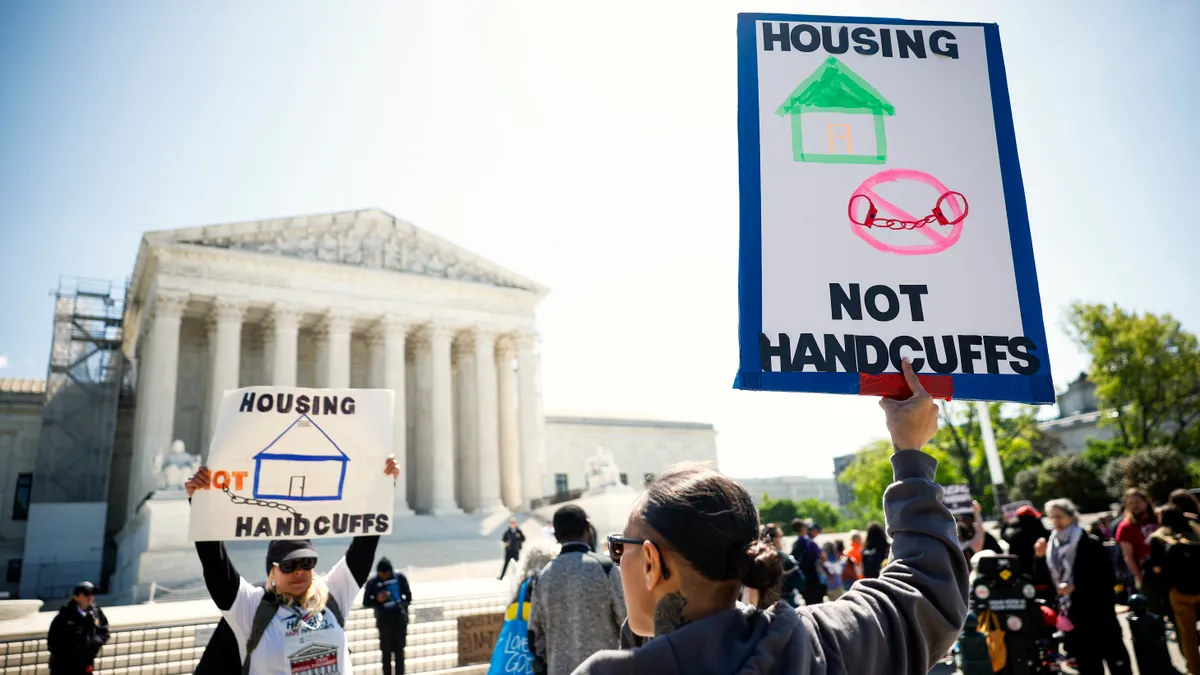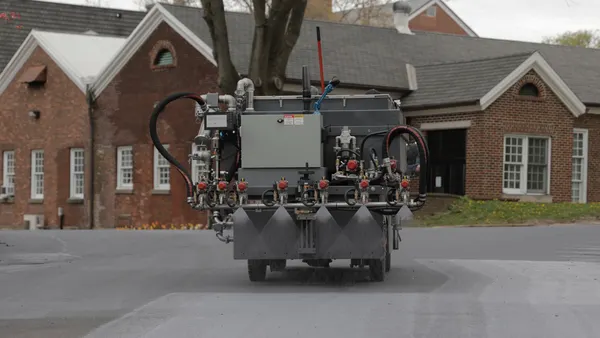Dive Brief:
- The U.S. Supreme Court ruled 6-3 on Friday that anti-camping laws in Grants Pass, Oregon, do not qualify as “cruel and unusual punishment” prohibited by the Eighth Amendment, in what some have called the most significant case involving homelessness in decades.
- Many cities and states advocated for the high court to side with Grants Pass, since the decision will guide how officials nationwide can address homelessness and encampments. Civil rights advocates, however, have decried such “camping bans” as unjust, unconstitutional and counterproductive to solving homelessness.
- The ruling reverses previous decisions by lower courts, which struck down the Oregon city’s civil punishments for those sleeping outdoors in public, even when no shelters were available.
Dive Insight:
In 2018, a group of people experiencing homelessness in Grants Pass, Oregon, sued the city for ordinances that made sleeping in public spaces punishable by a civil citation. With limited shelters in Grants Pass, the plaintiffs said they had nowhere else to go.
A district court sided with the plaintiffs, issuing an injunction that prevented Grants Pass from enforcing its anti-camping laws. The 9th Circuit agreed, ruling that when people experiencing homelessness have nowhere else in Grants Pass to go, the city’s rules violate the Eighth Amendment, which prohibits “cruel and unusual punishment.”
The U.S. Supreme Court agreed in January to review the 9th Circuit’s decision and heard oral arguments in April. The judges’ decision comes during a time of crisis for many cities: Homelessness in the United States, on the rise since 2017, hit a record high in 2023, according to the federal point-in-time counts.
In the June 28 opinion, Justice Neil Gorsuch wrote that while the Eighth Amendment “serves many important functions,” it doesn’t authorize federal judges to dictate the country’s homelessness policies.
“Yes, people will disagree over which policy responses are best; they may experiment with one set of approaches only to find later another set works better; they may find certain responses more appropriate for some communities than others,” he wrote. “But in our democracy, that is their right.”
Some cities, states and advocates for businesses and homeowners urged the high court to overturn the 9th Circuit decision and allow the enforcement of anti-camping laws. The League of Oregon Cities, the city of Portland, Oregon, and other Pacific Northwest groups argued in a brief to the high court that restrictions on such laws place “unworkable restraints” on local governments, resulting in encampments that overwhelm public spaces and threaten public health and safety.
Justice Sonia Sotomayor wrote a dissenting opinion, joined by Justices Elena Kagan and Ketanji Brown Jackson. The Grants Pass ordinances “are enforced exactly as intended: to criminalize the status of being homeless. City officials sought to use the Ordinances to drive homeless people out of town,” Sotomayor writes.
Some experts point to other ways cities can address homelessness. In a June report, Urban Institute researchers encouraged alternative strategies that don’t criminalize those experiencing homelessness. The “evidence-based” strategies include providing housing, ensuring access to safe emergency shelters and sending medics and social workers instead of police to respond to crises involving people who are homeless.
“Punitive responses to homelessness are costly to cities and do nothing to solve homelessness or prevent someone from experiencing homelessness again,” the researchers write.
Swift reactions from city officials, advocates
The Supreme Court’s decision elicited same-day reactions from stakeholders across the country, including the city of Grants Pass. The city said in a statement that its city council will discuss its next steps once legal counsel thoroughly reviews the Supreme Court’s opinion.
San Francisco Mayor London Breed said in a statement that the decision will help the city manage public spaces more effectively and efficiently. She added that while San Francisco has invested in shelter and housing, some people experiencing homelessness reject assistance.
“Those who refuse our help or those who already have shelter will not be allowed to camp on our streets,” Breed said. “It’s not healthy, safe, or compassionate for people on the street and it’s not acceptable for our neighborhoods. “
Other mayors shared different perspectives. Boise, Idaho, Mayor Lauren McLean advocated against criminalizing homelessness in a statement, instead encouraging strategies like providing permanent supportive housing.
“The Supreme Court’s decision in Grants Pass v Johnson will not change our approach,” she said.
Meanwhile, some advocacy groups expressed outrage at the Supreme Court’s decision. The National Homelessness Law Center condemned what it called an “inhumane” ruling in a statement. Scout Katovich, staff attorney at the ACLU’s Trone Center for Justice and Equality, said the organization “will continue litigating against cities that are emboldened by this decision to treat unhoused people as criminals.”











